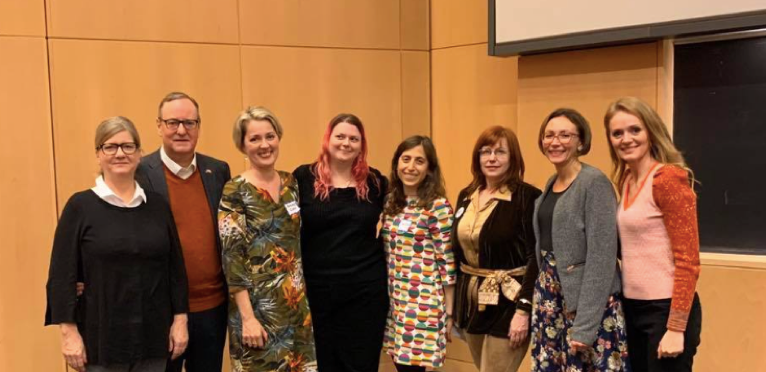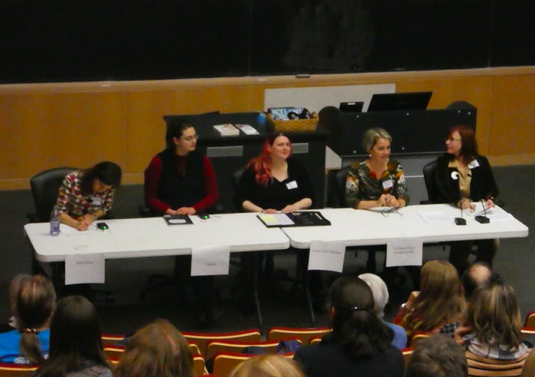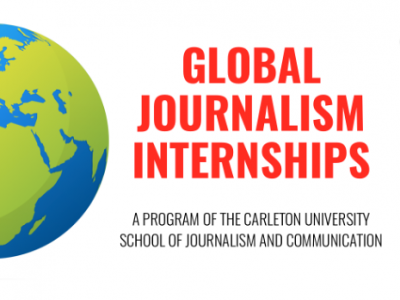By Miranda J. Brady and Christine Jenkins
Did you know that autism spectrum disorder (ASD) can present differently in women and girls when compared with their male counterparts? On Friday, 15 November 2019, Carleton University hosted a film screening and panel that shed light on the unique experiences of autistic women. The Icelandic documentary, Seeing the Unseen, directed by Bjarney Ludviksdóttir and Kristjan Kristjánsson illustrated that autistic women around the world face some of the same struggles but can also find support in one another. The 17 self-advocates featured in the film explained that they encounter a lot of ableism in their communities, as well as medical and psychological systems that fail to recognize the markers of ASD in women, often leading to misdiagnosis. This can mean women and girls miss opportunities at getting the supports they need. The film explained that because women and girls are sometimes socialized to be ‘people pleasers’ they are encouraged to mask or internalize their autism, which is sometimes impossible and can have serious consequences for their well-being.

Caption: (L to R) Jóhanna and Ambassador Pétur Ásgeirsson, Guðlaug Svala Kristjánsdóttir, Corina Lynn Becker, Dori Zener, Christine Jenkins, Prof. Miranda Brady, and Olof Sigvaldadóttir
In attendance at the event were the Ambassador of Iceland, Pétur Ásgeirsson and Guðlaug Svala Kristjánsdóttir, one of the women featured in the film who travelled from Hafnarfjordur, Iceland to Ottawa for the screening. Her travels and accommodation were sponsored by the Embassy of Iceland in Ottawa and the Icelandic Autistic Society. Kristjánsdóttir also ran a workshop the morning of November 14 in the MacOdrum Library Discovery Centre for support workers and educators who wanted to learn about autism and gender.
Event organization was a group effort supported by several sponsors including the Communication and Media Studies program in the School of Journalism and Communication (COMS), the Office of the Dean of Faculty of Public Affairs (ODFPA), Carleton International, and Film Studies.
Self-advocate Christine Jenkins first envisioned bringing Seeing the Unseen to Ottawa because it was the first film about females that really resonated with her. Jenkins started the Ottawa-based support group Asperfemme in 2011, and later the online support group AsperDames, is a contributor to the 2018 JKP/UBC Press book, Spectrum Women: Walking to the Beat of Autism, and writes for Spectrum Women Magazine.
Jenkins (BJ’82) first saw the documentary the day after it was released on Vimeo in June, contacted Ludviksdóttir and the Embassy of Iceland in Canada, and was introduced to Miranda J. Brady, an Associate Professor in COMS. It did not take long before a planning team was in place including Jenkins, Brady, and Gunnar Iversen, a Professor in Film Studies who specializes in Nordic film, and Research Assistant Margaret Janse Van Rensburg, an MA student in Social Work, who recruited a team of eight student volunteers to help provide supports.
Following the film screening, Jenkins moderated a panel including Kristjánsdóttir, two Ontario-based ASD advocates, and a Toronto therapist who works with women on the spectrum (see full bios below). Among other topics, panelists discussed some of the challenges and strategies they used when entering the workforce such as expressing their needs to co-workers and employers to help them better succeed. One of the main themes of the panel was that educators and the general public should learn more about neurodivergence so that they can recognize and appreciate neurological differences. Rather than assuming a deficit model, the panelists encouraged neurotypical people (those not on the spectrum) to recognize the potential of women on the spectrum.
The “Seeing the Unseen” trailer is available through Vimeo, and the film can be viewed for $10. Full panelist bios are listed below.

Caption: (L to R) Panelists Dori Zener, MSW, RSW; Lakota, Corina Lynn Becker, Guðlaug Svala Kristjánsdóttir, and Christine Jenkins. Photo courtesy L. Ferenchik
Christine Jenkins (she/her) is a very late-diagnosed autistic woman from Ottawa. She has written extensively and presented often in the decade since her assessment at age 48. Her own need for support and affirmation led her to co-found Asperfemme Ottawa in 2011. In 2018, she and two other area women formed AsperDames, a closed FB support group for older women. She is frequently interviewed as an expert on adult autism and just returned from Edinburgh where she presented a talk “Ageing (dis)gracefully” at the NAS Women and Girls conference. In November she became a Peer Reviewer for the journal Autism in Adulthood.
Autistic female identification has become her passion, and Christine has served and continues to serve on several boards and advisory groups promoting services for women and adults. These include the Asperger’s Society of Ontario, the CAMH Advisory Group on Women and Girls under Dr. Meng-Chuan Lai, and most recently the Ottawa Adult Autism Initiative (OAAI).
Christine has been a private music teacher and Carleton CKCU radio host among many other assignments.
Corina Lynn Becker, VP, Autistic Women and Nonbinary Network
Corina Lynn Becker (she/her) is from Kingston, Ontario. She identifies as autistic, nonbinary, asexual, chronically ill, disabled, and ADHD. Corina graduated from Wilfrid Laurier University in 2008 with a B.A. in English, and is currently finishing her B.A. in Disability Studies at Ryerson University. She has been awarded the M.K. Chant Disability Studies Award and the Bill and Lucille Owen Award in Public Policy at Ryerson, and ASAN Award for Exceptional Service to the Autistic Community for developing Autistics Speaking Day (ASDay). Currently, she is the Vice President of the Autistic Women and Nonbinary Network (AWN), formerly the Autism Women’s Network.
Dori Zener, MSW, RSW Individual, Couple and Family Therapist
Dori has been working with families affected by autism, learning disabilities and intellectual disabilities for over fifteen years. As an Individual, Couple and Family Therapist, Dori uses evidence-based therapy techniques to help each client achieve their goals and enhance their lives. She is passionate about Neurodiversity and autism acceptance. Dori works with individuals across the lifespan, and has expertise working with autistic girls and women.
Dori presents regularly at conferences on the topic of autism and mental health.
Dori is the founder and co-facilitator of Asperfemme Toronto, a free support group for adult women with official/self-diagnosis on the autism spectrum. Members meet monthly to validate, inform and support each other, and to foster friendships and social contacts.
Guðlaug Svala Kristjánsdóttir (she/her) is from Hafnarfjordur, Iceland. She was diagnosed with Asperger’s Syndrome at the age of 45, and has been recovering from severe burnout for the last two years. She is the mother of three sons (20, 17 and 12 years old), two of whom share her diagnosis and were diagnosed, as is typical, well before herself. Guðlaug is a physiotherapist, was president of the Icelandic Association of Academics (2008-14) and has been a city councillor in her hometown for the last five years. Among her special interests/stims are knitting, crocheting, gardening and reading. After being one of the subjects of Seeing the Unseen, Guðlaug started promoting the film, working on screenings and panel discussions across Iceland.
Lakota (she/her) is an electronics tester at a high-tech company in Kanata. In addition, she is involved with the maker community here in Ottawa, and enjoys art and writing as side hobbies. She was diagnosed with Asperger’s Syndrome and other co-existing conditions when she was five years old and, with early intervention and a “feel the fear and do it anyway” outlook, has managed to get where she is today in her career. She attends Asperfemme Ottawa.
Tuesday, December 10, 2019 in Communication News, News
Share: Twitter, Facebook



